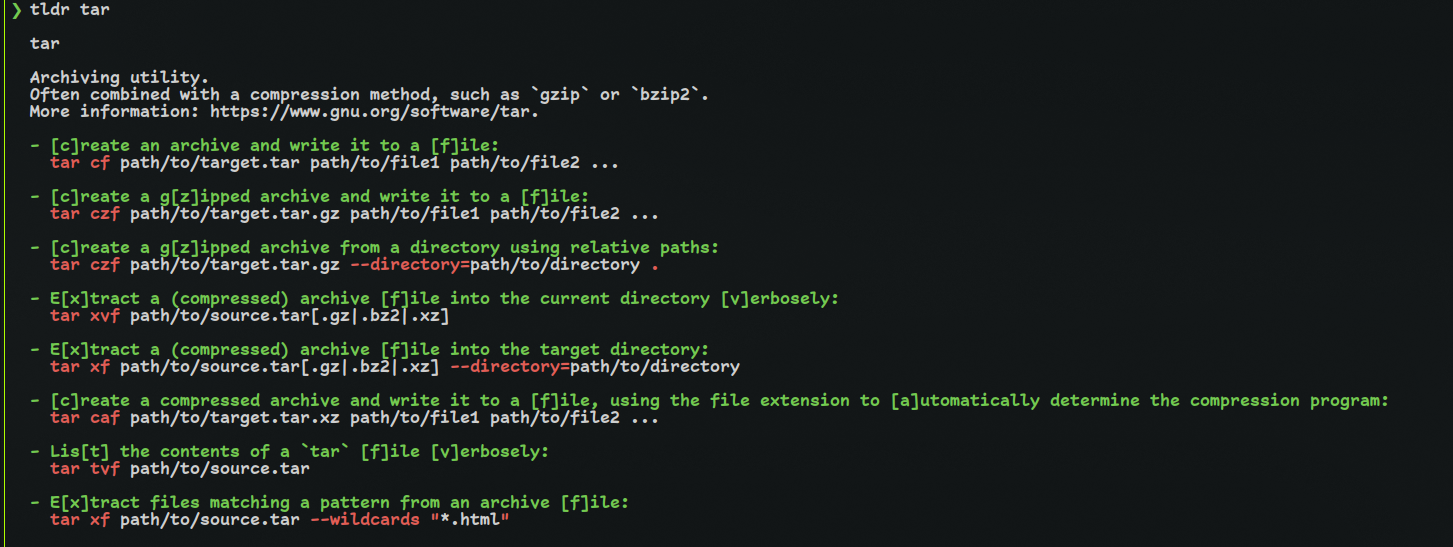img title=“I don’t know what’s worse–the fact that after 15 years of using tar I still can’t keep the flags straight, or that after 15 years of technological advancement I’m still mucking with tar flags that were 15 years old when I started.”
Wouldn’t tar --help suffice? Afaik, it returns exit code 0.
Depends. Is it GNU tar, BSD tar or some old school Unix tar?
Double hyphen “long options” are a typical GNU thing.
That’s why those commands have two?
Yes, the terse Unix version, which needs to be supported for compatibility, and the more readable GNU long option
tar -h?
~# tar -h tar: You must specify one of the '-Acdtrux', '--delete' or '--test-label' options Try 'tar --help' or 'tar --usage' for more information. *********************************************** WARNING: Self destruct sequence initiated ***********************************************
Ugh. Bsdtar:
-h (c and r modes only) Synonym for -L.
But it has --help too.
~# tar -h || tar --help
A little trick I learned on here was to imagine yourself as a little evil man saying “Extract ze files!” in a German accent. Extract ze files >>> xzf.
That sounds a lot like Czech, “ze” means “from” if you translate it into English
Looks, not sounds. Ahoj!
I still use that. 😅
tar --help
Exactly what I would have done !
This is the way
tar -xzvf archive.tar.gzeXtract Zhe Vucking File
Sorry, it was Solaris - you just blew it up (the minus is invalid on many Unix versions of tar)
Oh come on!
Inadvertent oracle attack.
xtract ze vucking file
Then comes a .tar.bz2 file along and you’re screwed. xtract je vucking file?
Pro tip: -z, -j are not needed by tar anymore since many years, tar will autodetect what compression was used if your distro is anything remotely modern.
Pro tip: -z, -j are not needed by tar anymore since many years, tar will autodetect what compression was used if your distro is anything remotely modern.
😵
You still might want to do something like alias pbtar='tar --use-compress-prog=pbzip2 to easily use pbzip2 - unless you have an ancient system that’ll speed things up significantly. And even if you don’t it’d be nice to use it for creation - to utilize more than one core the archive needs to be created for parallel extraction.
Yeah I usually just do xf. 🤷♂️
v is just verbose, right?
Yep.
I’m so proud of me when I remember this. Hackerman!
If you can’t tar to a pipe into ssh to a remote host and untar into an arbitrary location there, are you really using Unix?
I had to pipe dd through gzip over SSH recently to locally image a disk on a cloud server. That was fun.
What the fuck lmao I didn’t know that was possible
I remember those 2 and thats all I need.
tar -extrakt ze file
tar -compress ze fileTar Xtract Ze Vucking File
Edit: apparently someone else already mentioned this, oops
tar -extract -any -file is easier, auto detect the compression based on filename.
I think GNU tar automatically detects the compression, making
-aunnecessary in that case.And
-z.tar -xf foo.tar.{gz,xz,zstd,...}will work perfectly fine.
Nope - it was Unix not Linux. The minus makes the command invalid on many Unix versions of tar (though most modern BSD versions allow it)
Gonna blow up then I guess
tar -extract -file
tar -compress -xz -file
tar --helpis a valid commandFor GNU
tarit is, for any other version I would not be so sure. Especially when disabling an atomic bomb.More of a request than a command, I’d have argued
I command you to show me the manual
tar xvf somearchive.tar
Is that right? )= I’m scared I lost.
user@server:~> tar xvf somearchive.tartar: somearchive.tar: Cannot open: No such file or directorytar: Error is not recoverable: exiting nowScheiße…
Yep that’s valid.
Surely
tar --helpis a valid tar command, right?tar
Done. That’s a valid command, no error code, nothing. KISS!
false
tar: You must specify one of the '-Acdtrux', '--delete' or '--test-label' options Try 'tar --help' or 'tar --usage' for more information. zsh: exit 2 tar💥
OK now I have to escape to really smart assery and assume that’s what I meant the whole time ;)
Edit code 2 describes something that went wrong - but that something telling you that it went wrong was the tar binary which therefor most have been valid to evaluate that!
Under no circumstances did I assume that the hint towards help itself would’ve been an exit code 0, no sir!
To be honest: if I’d designed that bomb it would’ve exploded in my face for trying to be too clever.
tar --help
deleted by creator
I know this is a meme, but I actually find
tarfairly easy to remember.tar -xf $archiveis extract filetar -czf $archive dir/is create zipped (compressed) file and the positional arguments are the files to add to the archive.And this is 99% of my usage. You can skip
-f $archiveto use stdin/stdout or use-Cto change directory (weird name but logically tar always extracts to the current directory). There is also a flag to list which I always forget and lookup each time, but I list much less often.-vis useful for verbose.Overall there are much harder commands to remember.
findalways gets me if I go beyond-name.ps,treeandls(beyond-Al) always get me to open the man page.There is also a flag to list which I always forget and lookup each time
That would be
-t, which I tend to remember as “test”, as in testing to see what is inside the archive!tealdeer is a great program to have installed for easily getting a breakdown of the flags of pretty much any CLI app that at least I can ever think of!

man tar“Yeah nvm, we’re fucked”
tldr tarand you might have a chanceHaha yeah that was my second comment on this post
The command that I can never get right the first time is
ln. I always end up creating a dead link inside my target folder, even when I read the man page directly prior.Normally I would say view the man page (as a command). Though for some reason when making the thinnest distro possible, the OS team at my job got rid of man.
Wtf man.
man wtf

























